Locals take on China's invasion of Africa's biggest economy: 'They're like Goliath, we're David'
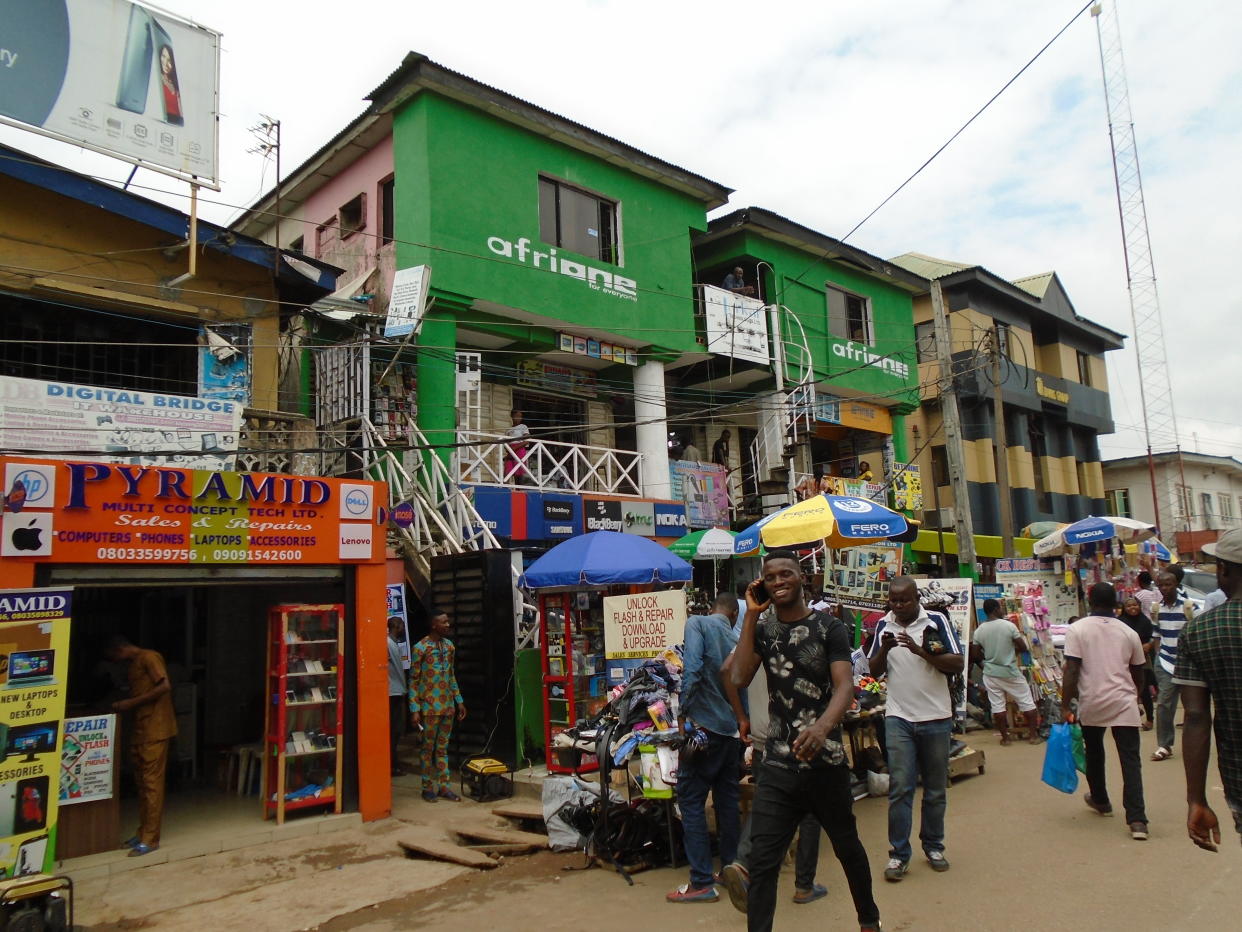
LAGOS, Nigeria — At Lagos’s Computer Village, buyers, sellers, wholesalers, hawkers and opportunists jostle for a piece of a booming industry. On a recent Wednesday tall stacks of shrink-wrapped printers and copying machines sat along muddy gravel streets. Peddlers hawked batteries, keychain USB drives and every conceivable model of mobile phone out of cardboard boxes.
Bigger deals went down in the jumble of buildings overlooking the chaos. In air-conditioned showrooms, bright rows of competing company-branded displays, attended by beaming salespeople in company-branded polo shirts, tried to entice bulk purchasers of the most important gadget in the country: smartphones.
Computer Village stands at the head of the cellphone supply chain for a country that has more than 180 million people and the largest economy in Africa, with a 2016 GDP of $405 billion.
“Brand acceptance can be created from this market,” said Rajesh Ramakrishnan, the representative of the Lagos-based AfriOne, which makes mobile devices among other products. Implausibly, he described the chaotic scene as being subdued by Computer Village standards. As we fought through the crowded streets, salespeople in AfriOne polos would dizzyingly emerge from the throng to talk to him, and then vanish just as quickly. He calmly defused a confrontation with a group from one of the merchant associations who tried to stop me from using my camera. “It’s a very comfortable place,” he said, also implausibly. “But be careful.”
AfriOne is the first company to assemble smartphones in Nigeria. It’s new to Computer Village, and only began selling its two models of Android-based devices, priced at around $75, earlier in the summer. Companies that want to be visible in the market’s maelstrom of activity often buy building fa?ades and paint them in their corporate colors, and Ramakrishnan pointed out the boxy concrete cantilevers of a building coated in AfriOne forest green and capped with the company’s logo.
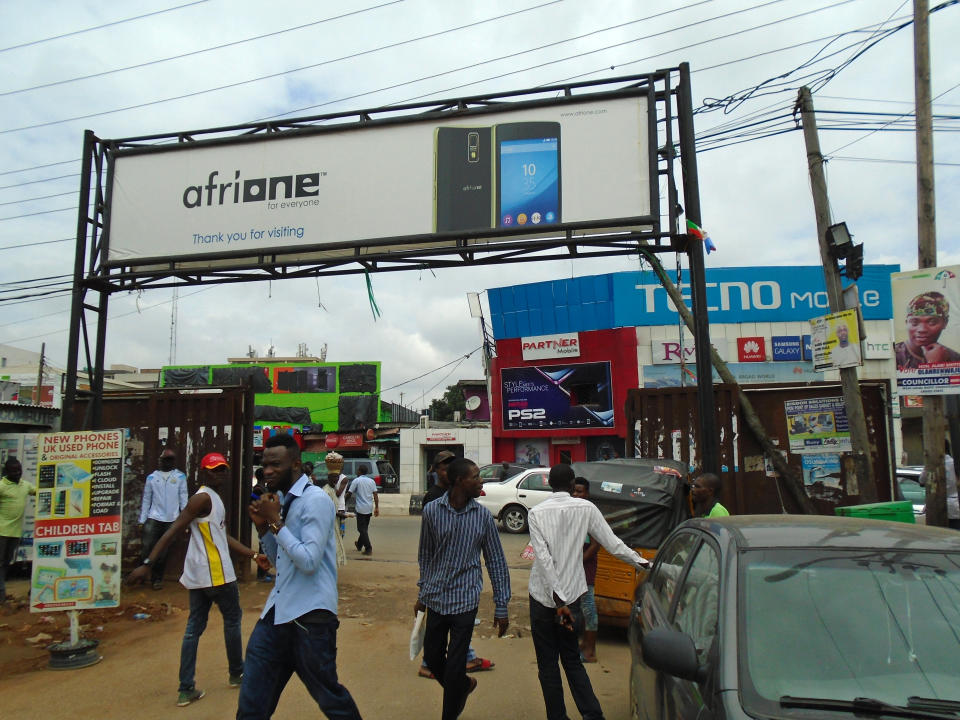
But half the neighborhood was covered with the distinctive powder blue of Hong Kong and Shanghai-based Tecno. That was also the color of the market’s solar-powered street lamps, which the phone producer had donated. Tecno’s story is a model for how Chinese companies have leveraged inexpensive manufacturing and clever marketing to dominate lucrative markets around the world, in Africa especially. The success or failure of upstart local challengers like AfriOne will help determine how long that dominance can continue.
Tecno’s parent company owns 3C Hub, one of the market’s busiest outlets. AfriOne doesn’t have a display there: In order to set up at 3C Hub, “we would have to disclose our marketing plan, and it’s easy for a brand like Tecno to kill us,” Ramakrishnan explained. He’s sure it’ll just be a matter of time before AfriOne is big enough to be invited to the outlet with no questions asked. “Let the demand come. Then they will bring us here. In the next six months, it will happen,” Ramakrishnan promised.
AfriOne’s made-in-Nigeria smartphone will either turn out to be a novelty or a farsighted gambit. Today, an estimated 30 percent of Nigerians have internet-capable phones. The market is large, but just a fraction of what it could be. “There will be such a massive population explosion, and the curve to reach eventual mass market is so far out there,” says Lekan Akinjide, AfriOne’s director of strategy and government coordination, who noted that Nigeria’s population of around 186 million is projected to grow to as much as 400 million by midcentury.
Nigerians already have abundant smartphone choices, often from Chinese brands whose names are unknown in the West: companies like Innjoo, Xiaomi, and Gionee. Nigerians can buy a basic Tecno L7 for 13,000 naira ($36) or a Tecno Phantom 6, with high-resolution cameras and fingerprint-enabled security features, for 127,000 naira ($350). Smartphones are sold at nationwide chain stores, but also at market shacks and rural gas stations. On Jumia, Nigeria’s leading e-commerce site, the average price for a smartphone dropped from $216 in 2014 to $117 this past year.
In a country where land-line phones and high-speed connections are rare, smartphones are Nigerians’ window onto the world around them. “We feel like we have some catching up to do in terms of technology, and the only way we can relate to technology is through our phones,” says Eric Okafor, a Lagos-based marketing consultant and consumer electronics reviewer. Information is being democratized, largely because of Chinese phone producers with plentiful capital and vast economies of scale on their side.
Still, poor infrastructure and rampant corruption conspire to make Nigerian products uncompetitive even within the country’s borders. AfriOne is trying to jump-start a high-tech consumer electronics manufacturing industry where none has previously existed.
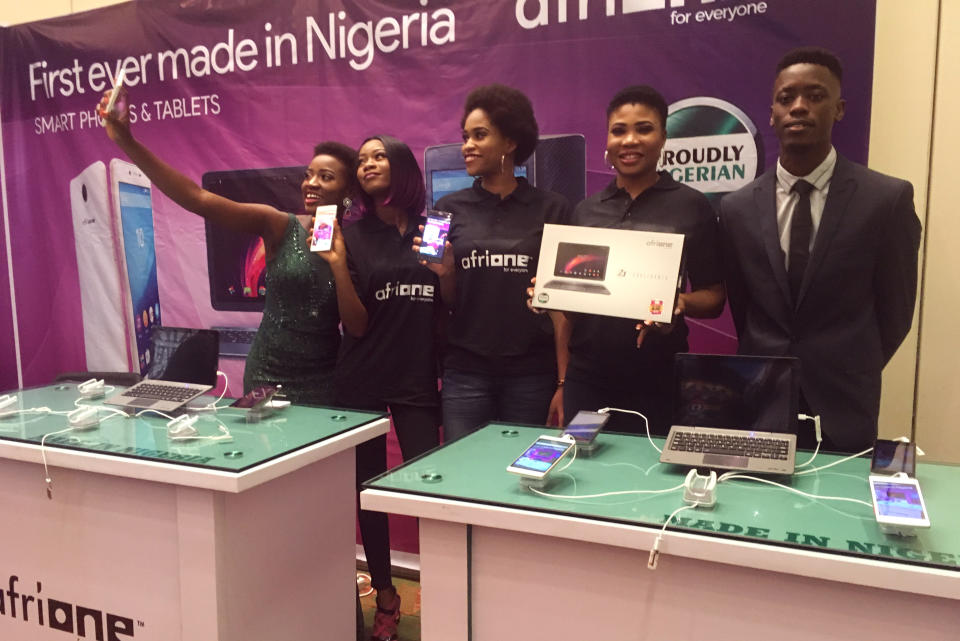
The company is a small but revealing test case in whether Nigeria can transcend the dysfunction and import dependency that’s jeopardized the country’s progress. But in order to do that, they’ll have to take at least some market share away from Chinese producers, and that won’t be easy. “They’re giants, and we are little,” said Roheen Berry, vice president of Contec Global, AfriOne’s Dubai, London, and Lagos-based parent company, when asked about Tecno. “They’re like Goliath, we’re David.”
Tecno, founded in China in 2006, was an unlikely winner of the Nigerian phone wars. In Nigeria, Tecno first started selling inexpensive feature phones in the late 2000s, hoping to reach consumers at the lower end of the market. That only earned its products a reputation for cheapness. Tecno rethought its strategy and started gaining traction in Nigeria around 2013, when it introduced Android-based devices priced at a fraction of Samsung’s offerings.
Luckily for Tecno, the Nigerian economy collapsed in 2015. Nigeria is a major oil exporter and the global plunge in prices sent the economy into a tailspin, worsened through a series of protectionist economic reforms decreed by Muhammadu Buhari, the 74-year-old former military dictator elected president that year. Between June and August of 2016, the naira rapidly lost value, with the official exchange rate plunging from 200 to nearly 350 to the dollar and the actual street value of a dollar ballooning closer to 460 naira. An iPhone suddenly cost about half as much as a car. For the price of repairing a Samsung someone could buy two new Tecno phones of comparable quality. Unlike their American, European, or Korean competitors, Chinese companies were offering Nigerian consumers products they could actually afford, even when the economy entered a disheartening five quarters of recession.
Tecno grasped Nigeria at a level that other phone producers couldn’t match. Its devices had dual SIM slots and claimed to have 72 hours of battery life — major selling points in a place where people often use multiple carriers, and where electricity can be fleeting. Their phones had sleek metal frames, in line with Nigerian tastes. The owner of Slot, a popular nationwide electronics retail chain, received a lucrative franchise for Tecno products and is now the CEO of Tecno’s Nigerian subsidiary. Tecno launched apps for the company’s target market, including a successful Africa-focused music streaming service called Boomplay, which comes pre-installed on its devices.
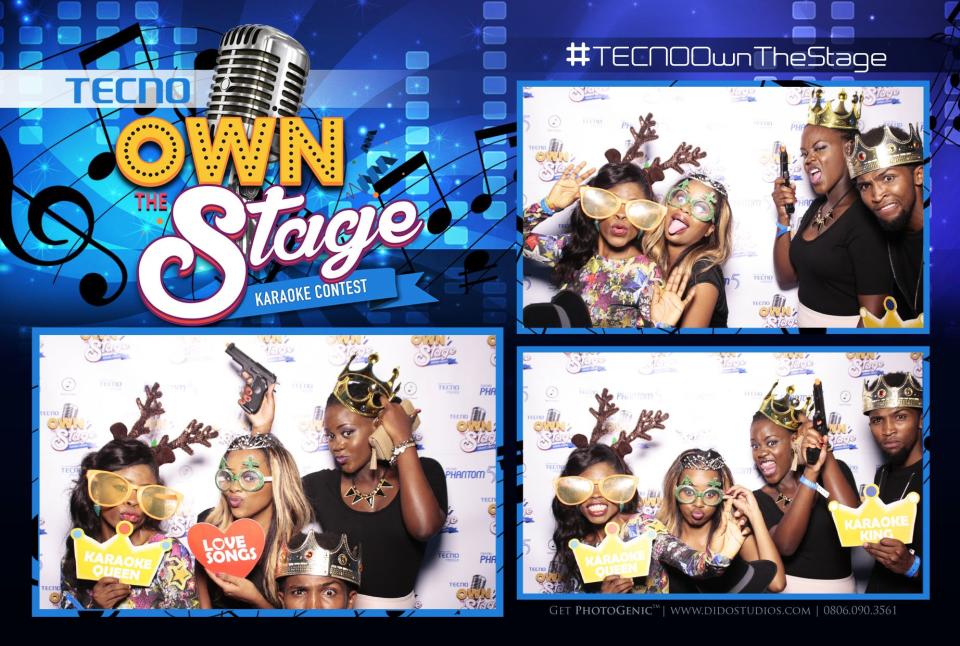
Most importantly, Tecno learned how to appeal to Nigerian consumers. “Marketing is the biggest thing at Tecno,” says Eric Okafor, who worked as a digital marketing executive in the company’s Lagos office from 2015 to 2016. “Everybody wanted to know what was going on with marketing. Nobody wanted to know what was going on with anything else.” As Okafor recalled, the company recruited Nigerian celebrities who could endorse their products in local languages. They mounted an aggressive series of road shows at universities, and even sponsored a popular TV karaoke contest, called Tecno Own the Stage. Tecno became a corporate partner of England’s widely followed Manchester City football club. They painted entire buildings all around the country. “There was a viral effect. And the whole market was blue!,” Okafor said. “You think, no way these people aren’t doing something right if the whole market is blue.”
At an early point in the company’s history, Tecno renamed itself Transsion Holdings, with Tecno as one of its subsidiaries. Transsion is now the umbrella company for two other phone producers whose devices are ubiquitous in Nigeria: Infinix, which is slightly upmarket of Tecno, and Itel, which is just downmarket. All three brands benefit from the illusion of competition—last year, Infinix was the most popular smartphone producer on Jumia, with Tecno placing a healthy third.
There’s a downside to Tecno’s success. Okafor recalled that Tecno employed many Nigerians in its Lagos office. But he said that none of the Nigeria-based managers from China were directly under the CEO of the company’s Nigerian subsidiary, who is himself Nigerian. “No Chinese person has a Nigerian boss, so to speak,” Okafor said. Certain marketing decisions were made in Nigeria, but everything else was handled in China, thousands of miles away.
Tecno is present in other places in Africa and has an assembly line of its own in Ethiopia. But it has almost no profile in the now hypercompetitive Chinese market — as one of its executives explained in 2013, the company only did business in Africa (although it entered the Indian market earlier this year.
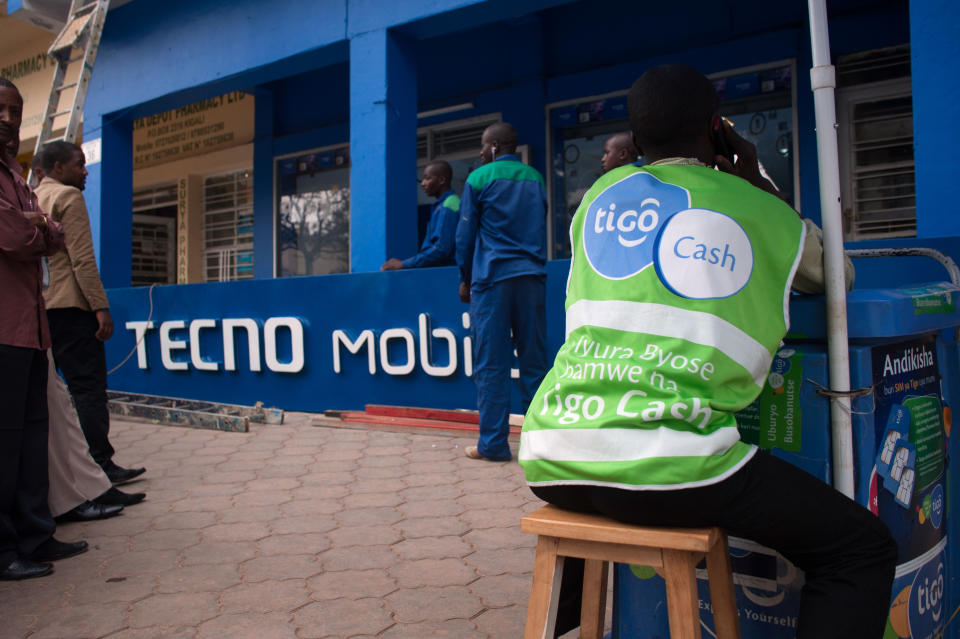
Like other Chinese companies, Tecno is active in places where it can saturate an underdeveloped market and leverage its advantages in sheer scale. It has the profile of a private enterprise, but its credit and financing sources are still opaque. “They’re very much integrated in the Chinese economic plan,” alleges Akindije, AfriOne’s director of strategy.
Nigeria can’t move forward without companies like Tecno. Only Chinese producers have proven capable or even interested in offering Nigerians the chance to own internet-enabled devices on such a vast scale.
But scale has its drawbacks too. David Shinn, formerly the U.S. ambassador to Ethiopia and now a leading scholar on Chinese-African economic relations, explained that there’s a long-standing pattern of Chinese imports making identical African products uncompetitive, even in the countries in which they are made. According to one widely-cited study, a surge in imported Chinese batteries led to a 70 percent plunge in the export of Cameroonian-made batteries to neighboring west African countries over a two-year span in the mid-2000s, smothering a productive industry — even in Cameroon, the Chinese imports sold for about a third the price of the local product. “Oftentimes the Chinese are able to undersell the African product, and it creates a real problem for Africans to industrialize or get beyond the export or the production of primary products,” Shinn said.
Shinn rejects the idea that China has a “neo-colonial” approach to Africa. “There’s no effort at governmental control of anything,” he explained “That’s not what they’re doing. But it is a mercantilistic approach. It’s not necessarily programmed [that way] but that’s the way it functions.” A resource-hungry China is sending smartphones and batteries to Africa — and getting oil, minerals and natural gas in return. In the process, Chinese companies gain access to rapidly growing consumer markets that are relatively free of major competitors.
Aubrey Hruby, a nonresident senior fellow at the Atlantic Council and an expert in Chinese-African trade, doubts that a relatively small Nigerian newcomer like AfriOne can break this dynamic. “It’s hard for me to believe that the local players can gain any competitive edge against [Chinese producers] without some major protectionism on the part of the government,” she says. “The Chinese players have scale. And they have a long-term outlook, and an ability to lose money and have very low margins for a while to take market share away from Samsung. That’s who Tecno’s competing with — it’s Samsung.”
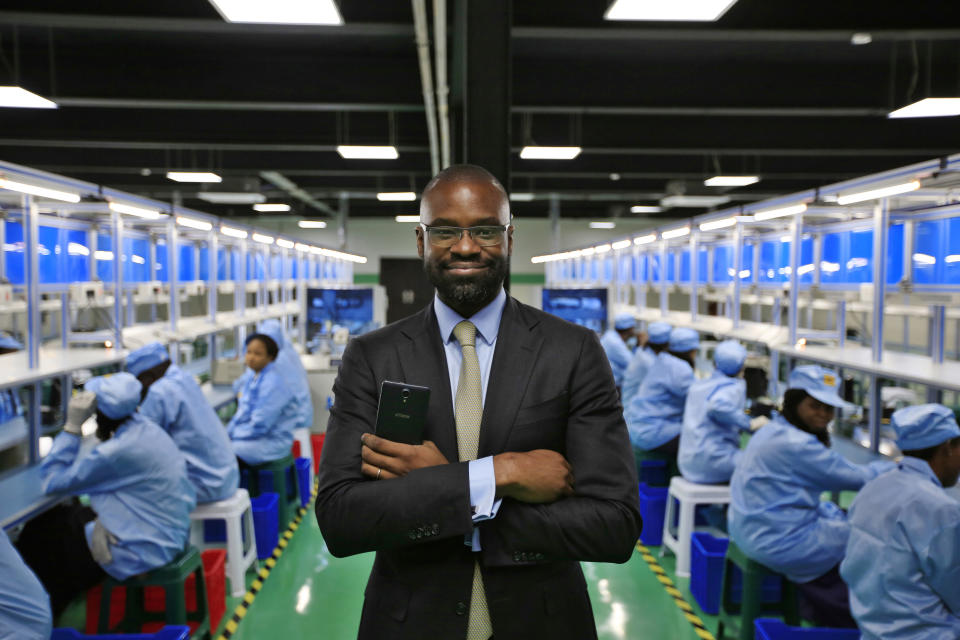
*****
Nigeria is a relatively poor country — it places 152nd out of the 188 states on the U.N.’s Human Development Index. It’s also famously capitalistic. In the absence of a functional state or reliable public services, Nigerians survive through barely-regulated market competition. “Lagos is one of very few cities in the world where you can get up, go across the road, and just start selling mobile phones.” says Ugo Obi-Chukwu, editor of the Nigerian business website Nairametrics. “Anybody can sell anything here. There are no restrictions. If we didn’t have that, people would’ve taken to the streets.”
The precariousness of everyday life means that anyone selling a smartphone is asking consumers to ignore more pressing needs. Smartphones are still aspirational products, a luxury that 70 percent of the population doesn’t own. Selling is hard enough to begin with — but building something new is even more difficult.
Sahir Berry, AfriOne’s 32-year-old CEO, says producing phones in Nigeria was a rational business decision. Because it’s the first smartphone assembly line in Nigeria, the AfriOne factory got “pioneer status” from the Nigerian government, meaning it can operate essentially tax-free for five years. The government is also newly committed to buying “made in Nigeria” products, as long as they meet a certain standard of quality — a development hinting at a major source of future business for AfriOne. Berry added that the duties on completed phones were four times higher than on imported phone components. “But,” he conceded, “that’s not helping us at the moment because nobody’s declaring anything that’s coming through the ports. Nobody’s playing by the rules.”
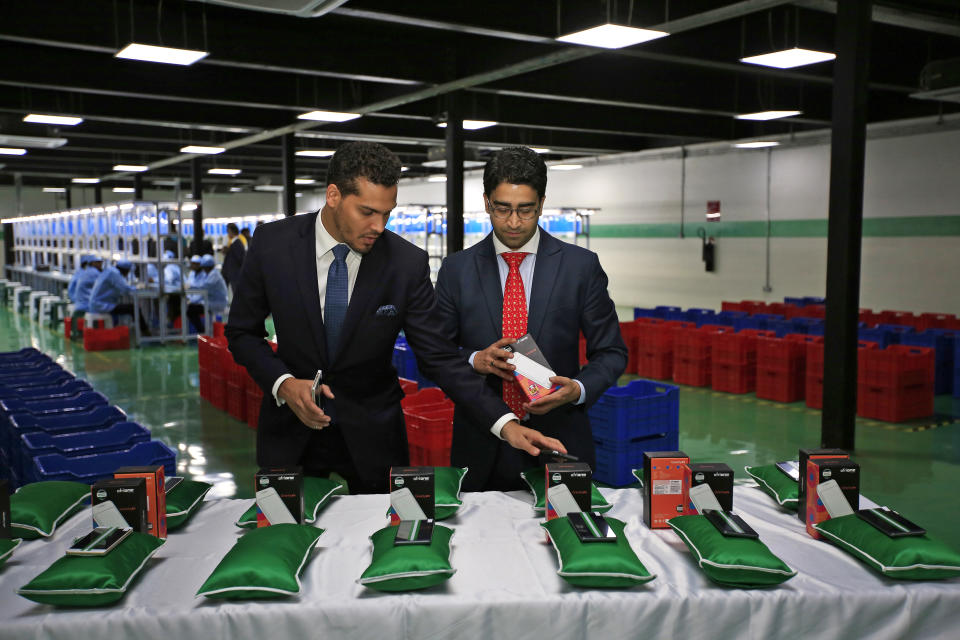
This sums up the pitfalls of trying to manufacture in Nigeria. Vague or nonexistent regulations, unreliable electricity, bad roads and an atmosphere of general disorder threaten any industrial undertaking. “You have ad hoc roadblocks all around the country, even within Lagos,” explained Ikemesit Effiong, a Lagos-based research analyst at SBM Intelligence. “There are arbitrary levies that add to the cost of goods and services. This disincentivizes Nigerian manufacturers from pricing competitively.” In 2015, the Economist reported that in Lagos, Nigerian-produced milk was selling for twice the price of imports.
AfriOne’s factory is a nondescript building next to a bustling highway that links the working-class mainland to the skyscrapers on Lagos and Victoria Island. Berry, who was born in Abuja and partly grew up in Nigeria, said discussion of launching a smartphone line began at Contec in February 2016. Developers in India, Dubai and Nigeria looked at an AfriOne market survey of 500 Nigerians and tried to design a dual-SIM-card 25,000-35,000 naira ($70-$95) phone based on the results. Both the Lagos factory and the first prototype were ready just 11 months later.
The factory employs 150 Nigerians. Lagos is a hard place to make ends meet: one worker in her early 20s, a recent business administration graduate, said she would be braiding hair if she didn’t have a factory job. The facility is clean, spacious and hushed, as if in defiance of its frenzied surroundings. Low-powered LED tubes cast a soft glow over ice-smooth concrete floors and rows of workers boxing tablets that they had assembled the week before: the factory is also churning out two-in-one devices (laptops that can convert to tablets) built out of imported components. It’s a low-electricity operation: On the day I visited, the entire factory was being powered through an inverter and a battery storing energy from a switched-off generator.
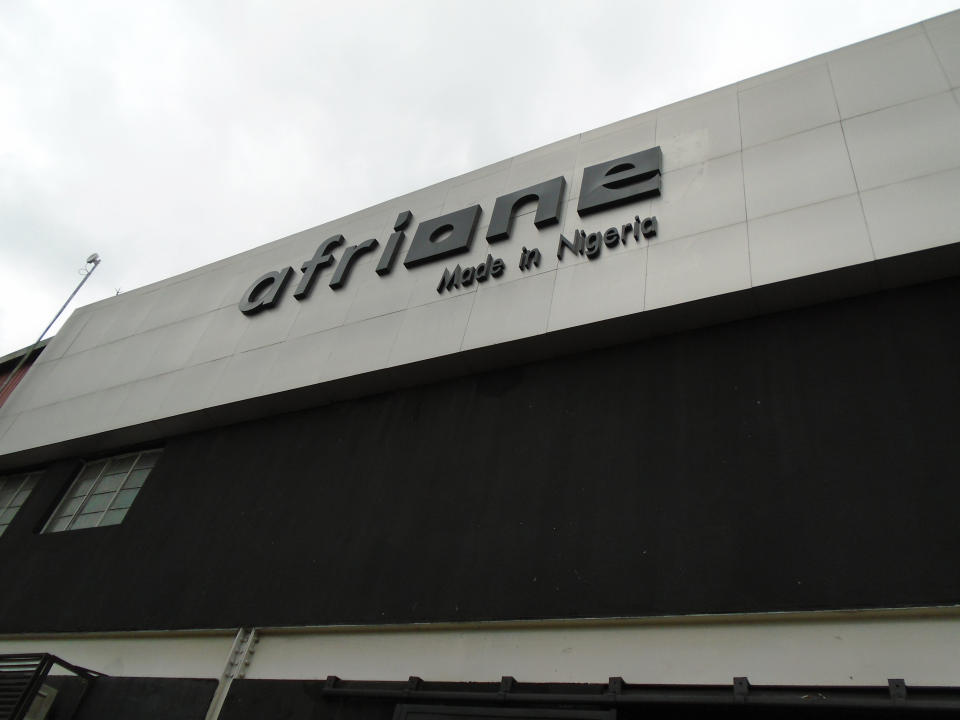
Berry acknowledged the difficulty of competing with imported brands but said, “We want to be the first pan-African mobile phone company.” He has ambitions for the plant to someday turn out a half-million devices a month, from components that will eventually be made in Nigeria. “We’re hoping that over the next couple of years some smart people will say you know what, we don’t need to import the microphone, we can produce it here,” said Berry. “We’re trying to create an industry.”
The factory, and the reality of a “made in Nigeria” smartphone, prove that the creation of a new high-tech manufacturing sector isn’t an impossible leap for Nigeria. But the facility and its products are just early steps in that direction, and their eventual payoff remains unclear. For now, when inching through the gridlock toward Lagos Island, it’s possible to totally miss that the AfriOne factory is even there. The same can’t be said for a building-sized billboard for Tecno’s Carmon CX phone next to Bonny Bridge in Victoria Island, where a trio of Manchester City players invite Lagosians to “show off your quality selfie.”
Armin Rosen is a New York-based writer who has reported from throughout Africa and the Middle East.
_____
Read more from Yahoo News:

